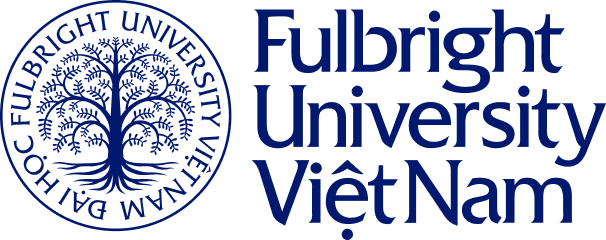
At the University of Texas at Dallas Computer Science program, one of the largest Computer Science departments in the United States, Dr. Tien N. Nguyen is a professor whose prolific research has had considerable impact on the software industry and academia of software engineering. In joining Fulbright University Vietnam as Acting Chair of the Computer Science Program, he finds a unique opportunity embodying not only his natal attachment to Vietnam, but through scientific rigor and research, the desire to propel the country’s technology and innovation capabilities to new heights.
Our story began in March 2020, when Thomas J. Vallely, Chairman of Governing Board of Fulbright University Vietnam, and Ben Wilkinson, Executive Director of Trust for University Innovation in Vietnam, paid a visit to the University of Texas at Dallas (UT Dallas) to discuss potential partnership between the two institutions. What ensued was a cordial dinner after which Mr. Vallely and Prof Nguyen, still ebullient with ideas, soon agreed to breakfast the morning after to continue their conversation. “It was 7 in the morning, before his flight back to the Harvard Kennedy School,” Prof Nguyen recalls.
There, what was further elucidated by Mr. Vallely as the long-term vision for Fulbright – Vietnam’s first not-for-profit, independent university, whose undergraduate program is fueled by the tradition of liberal arts and science – had ultimately won Prof Nguyen over, for in his own work he recognized that kindred spirit advocating for the central role of scholarship and research in the advancement of Vietnamese students and society. “It was also Mr. Vallely’s tireless and affable energy that really struck a chord with me,” he says. “My dream at Fulbright is to build a Computer Science program that can lead the way in scientific research in Vietnam, and one day, stand shoulder to shoulder with the top departments in Asia and the world.”
A leading researcher in Software Engineering
A native son of Saigon, Professor Tien N. Nguyen has spent 26-27 years living, studying, and working in Japan, Switzerland and the United States before joining Fulbright as Acting Chair of the Computer Science Program. The early days of his academic career had seen a series of achievements. In 1995, he earned the Gold Medal award, an equivalent of valedictorian, for what was then the first Computer Engineering and Science degree program of the Ho Chi Minh City University of Technology. “It was between HCMUT and the Foreign Trade University, for both of which I scored very high in the national entrance examination,” he says. “In the end, I followed my true calling, which was the field of mathematics and science, something I’d already excelled at in high school.”
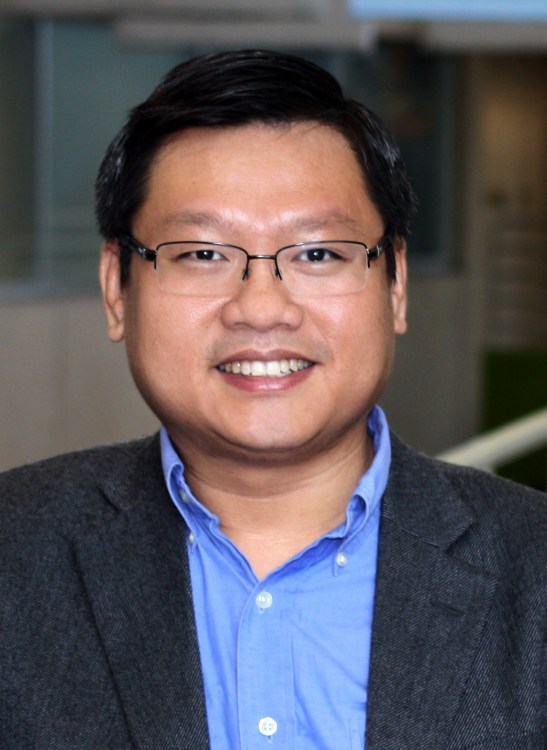
Professor Tien N. Nguyen
After graduation, Prof Nguyen moved to Japan for one year to attend an international student exchange program. The fact that information technology was still an infant industry in Vietnam, coupled with his desire to continually learn and grow, had landed him in Switzerland, where he completed his Pre-Doctorate (M.Sc.) on a scholarship from the Swiss Federal Institute of Technology, Lausanne. At the University of Wisconsin, Milwaukee, he earned a PhD in Computer Science and Engineering, then spent 11 years at Iowa State University working as Assistant and Associate Professors in the Electrical and Computer Engineering and Computer Science Departments.
In 2016, he joined UT Dallas and became a Professor at their Department of Computer Science in April 2020. On the CSRankings of top computer science institutions around the world, based on the number of publications by faculty that have appeared at the most selective conferences across areas of the field, UT Dallas regularly ranks within the top 50 in the US for the 2008-2020 period. When it comes to Software Engineering, Prof Nguyen’s primary research interest, the university is currently ranked No. 8 and most notably, he stands third for the number of publications he’s contributed for the past 10 years. Valued for their impact on both the industry and academia, since 2005, his research has been funded by both federal agencies and software corporations, with a total of 4.5M USD for his share from the US National Science Foundation, US National Security Agency, alongside Microsoft, IBM, ABB, and Amazon.
Three decades of professional and personal progress at what he calls “the three powerhouses across three different continents” have instilled in Prof Nguyen a fervent belief in the significance of academic rigor and research culture, especially when it’s thoughtfully fused with the potential of Vietnamese students well-regarded for their brainpower and studiousness. “My roots are still in Vietnam, simply because it’s the land that nurtured who I am since birth and all the way to the moment I completed higher education,” he says. “That is why I want to bring back to Vietnam what I consider as the best, the finest aspects from these developed countries’ educational systems and support our own development in teaching, learning, and research.”
The biggest hurdle for Vietnamese students to thrive in any academic environment, according to Prof Nguyen, is how to overcome their reluctance to open debate with socially and traditionally revered lectures. “I consider myself purely as a guide, someone who has prior experience in this field that we’re exploring together. In a sense, I am an advisor to my students, encouraging them to be bold and outspoken with their ideas, at the same time inspiring them to discover and pursue their own paths.” he says. “Instead of forcing students to heedlessly adhere to facts and figures, my priority always lies in helping them see for themselves the reason we do what we do. The question of ‘why’ must invariably precede the ‘what’ and ‘how’.”
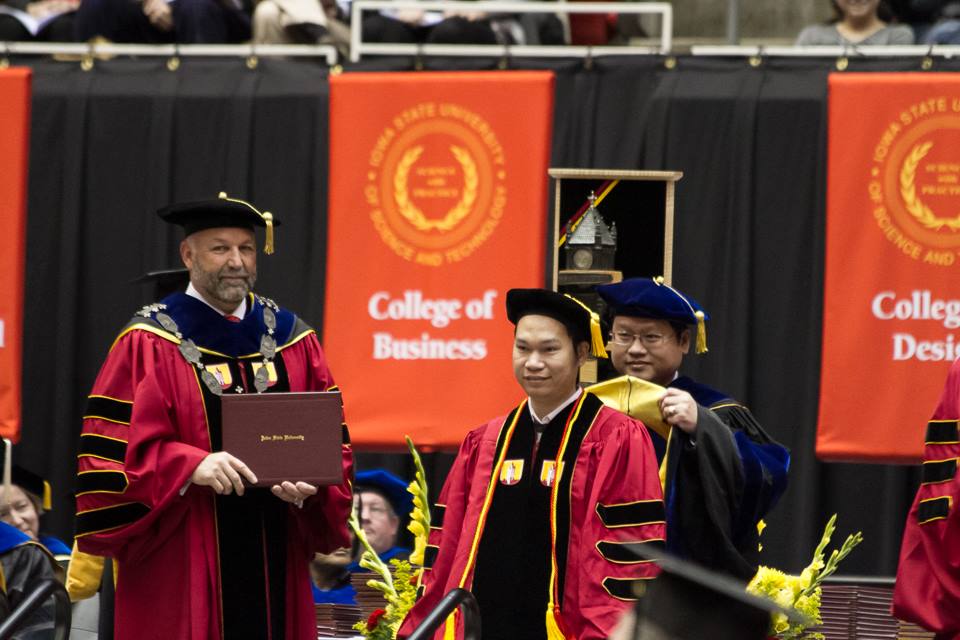
Professor Tien N. Nguyen at his student Nguyen Thanh Tung’s PhD Hooding Ceremony. Nguyen Thanh Tung is currently Assistant Professor at the Computer Science Department of Auburn University.
None other than his accomplishments in the field of Software Engineering research that echoes and illustrates precisely the aforementioned ethos. For the past 20 years, not only has he supervised and seen through the success of 14 Vietnamese PhD students in the United States, but collaboratively they have earned 4 ACM SIGSOFT Distinguished Paper Awards in 2009, 2012, 2014, and 2016 for research papers accepted into the annual world-renowned International Conference on Software Engineering and the annual International Conference on the Foundations of Software Engineering. Prof Nguyen is also Chairs and committee members of the top-tier international conferences in the field of Software Engineering from 2005 to now, while currently serving on the Steering Committee of the top-three international conference on automated software engineering (ASE).
“Naturally, new ideas don’t come to us every day. But if we don’t think about ideas every day, whether they’re right or wrong, big or small, that one new idea will never have a chance to come through,” he remarks. “Going back to the spirit of open inquiry and critical debate we have touched upon, I can’t stress how delighted I am every time a student questions or goes against my point of view, for that is the bedrock for a vigorous academic environment, in which everyone is free to exchange ideas, to bounce off one another so we can figure out new solutions that shall advance science and society at large.”
The Computer Science Program at Fulbright: Intuitive to the industry’s demands, Built for world-class scientific research
While the software industry in Vietnam has seen leaps and growth in recent years, not to mention the government’s incentives for nationwide digital transformation in the age of the Fourth Industrial Revolution, the local market is still confronted with shortages of highly skilled labor across areas of technology, including data analytics, artificial intelligence, programming, and information security, but to name a few. The challenge for universities in Vietnam to provide a creditable pipeline of talents, from Prof Nguyen’s perspective, doesn’t stem from any lack of financial resources which have improved significantly since his undergraduate days in the 90s, nor in any doubt as to Vietnamese students’ capabilities that he deems “rivalling the cream of the crop of developed countries’ institutions”, but instead, it’s an international mindset that in turn, trickles down to every aspect of how to build a curriculum which satisfies not only the ever-evolving demands of the market, but also elevating the status of Vietnam as a globalized hub for research and innovation within the region.
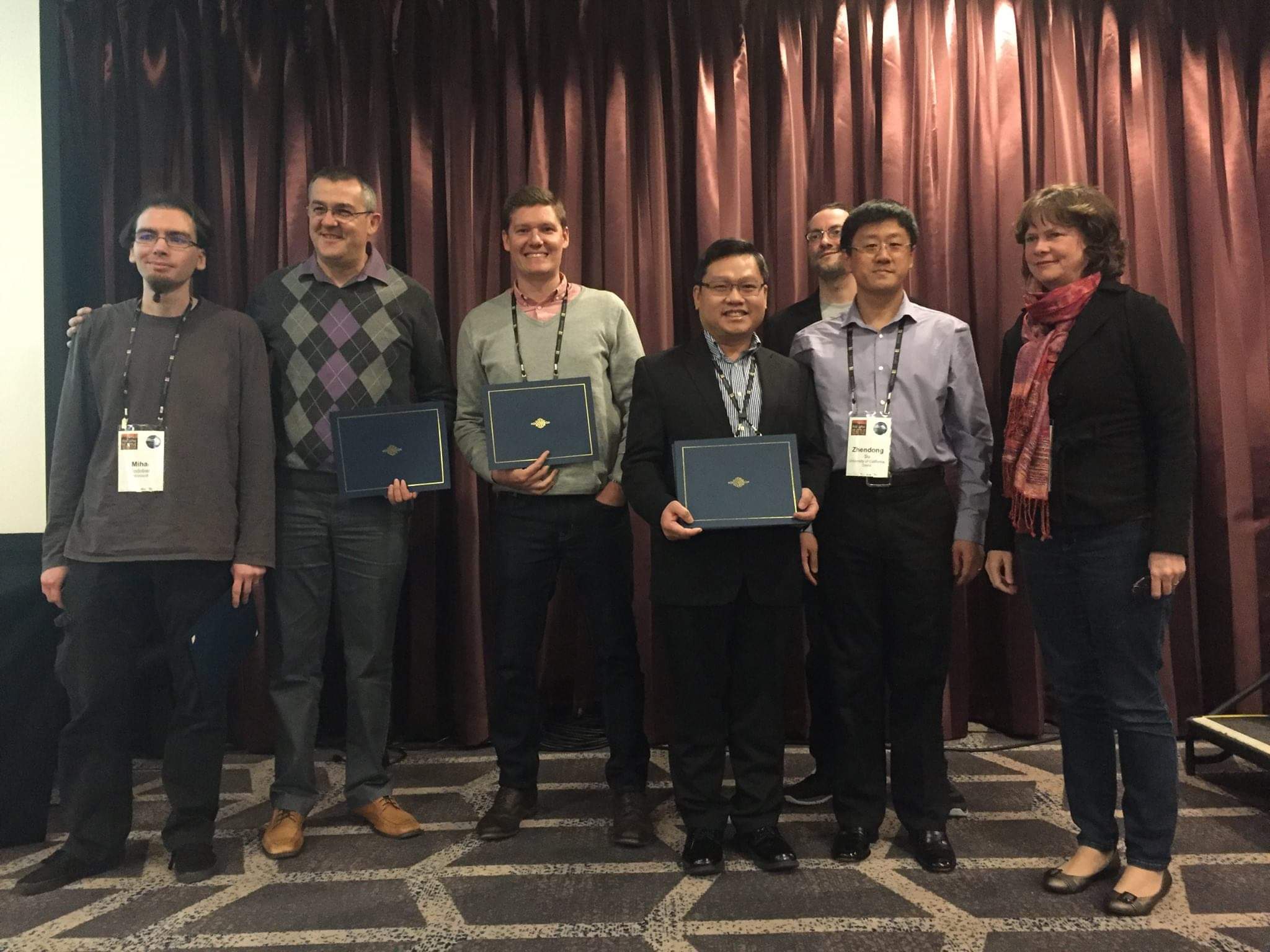
Professor Tien N. Nguyen accepting the ACM SIGSOFT Distinguished Paper Award tai the ACM Joint European Software Engineering Conference and Symposium on the Foundations of Software Engineering (ESEC/FSE).
In the field of computer science, Prof Nguyen stresses the pivotal role of research in enabling developers and engineers to build and maintain softwares of “exceptional quality, more secured, more reliable and robust, and above all, resulting in optimized productivity for users”. “The raison-d’être for scientific research in Computer Science is intrinsically built-in and reflected in its practical applications by industry insiders,” he says. “I oftenly encourage my students to fully assume the responsibilities of a scientist, meaning we must strive for scientific breakthroughs that shall uncover what has been hitherto unknown to science and humankind, to advance the cause for novelties and innovation within this field we love and passionately devote ourselves to.” This inseparable interconnection between theory and functionality is also what he aims to instill in the Computer Science Program at Fulbright: “Maybe today we’re not sufficiently armed to build the fastest car in the world, but our scientific research can serve as the catalyst upon which future generations of researchers and innovators can perfect the car’s parts and engines that will ultimately make our dreams come true.”
In the Spring of 2020, Fulbright University Vietnam and UT Dallas have officially agreed upon a partnership of educational collaboration and exchange. While the pandemic has put on hold future endeavors between the two institutions, the official appointment of Prof Nguyen as Acting Chair of Fulbright’s Computer Science Program in January 2022 can be seen as the first jumpstart among many to move forward with our initial plan in facilitating programs and initiatives that shall benefit students and faculty members alike. As much as spending his time to continuously pursue his research at UT Dallas, at the moment, Prof Nguyen has already played a vocal role in the restructuring and consolidation of the Computer Science program at Fulbright. “I’m fully aware that our common goals can’t be reached within a day or two, but by laying out the initial stepping stones, what I hope is to set up a solid foundation upon which all members of our community can rely and thrive together.”
Building on his experience from the joint success between various institutions and their collective manpower, Prof Nguyen is setting his eyes on promoting collaborative research projects between Fulbright and UT Dallas as a gateway for academics in Vietnam to get informed and inspired by the ongoing issues presently occupy the world’s leading institutions. “The very thing that I’m most proud of in every achievement along my career is the collective intelligence encouraged and fostered within my groups of researchers,” he says. “What I believe as a strong point of Vietnamese students is the avid and selfless attitude to work within groups, which has served as the recipe for success in all of our research and recognition by the scientific community in the US.”
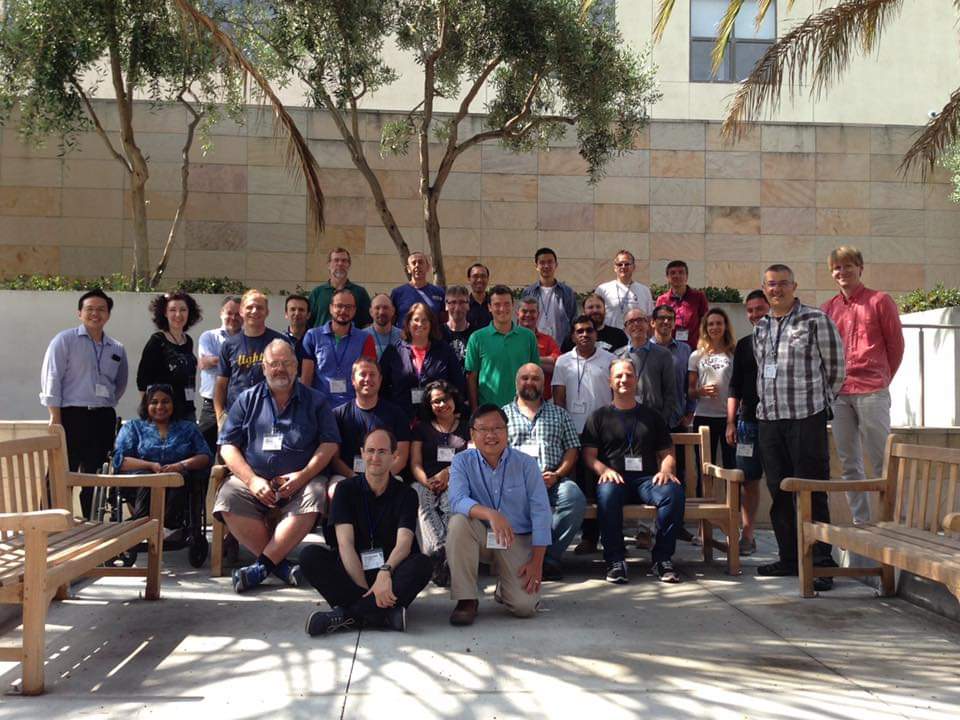
Professor Tien N. Nguyen as the Program Chair leading the Program Committee Meeting of the ACM/IEEE International Conference on Automated Software Engineering (ASE) in Santa Barbara, California.
Prof Nguyen is also a founder of the Vietnamese Software Engineering Research Network, an organization that connects Vietnamese professors, researchers and lectures across the world to bolster cross-institution scientific research in the field of software engineering, all the while organizing conferences in Vietnam and introducing Vietnamese students to PhD programs overseas that can help advance their professional career in research.
But most importantly, it is his steadfast standpoint regarding the Computer Science Program at Fulbright that resonates with the school’s core principles in delivering an international liberal arts education: “In place of a teaching tradition whose coverage is too broad or vague, nor a curriculum that’s heavily skewed toward hot trends bubbling in the market, what I aim for is the model of a reversed ‘T’ letter,” he says. “It means before our students are ready to delve into specialized areas such as artificial intelligence or big data, they need to gain a strong foothold in all the basics of Computer Science and a liberal arts foundation. Only then can our students be well-prepared to take on any challenges in the real world, and become flexible and adaptable to the rapidly changing world of science and technology.”
According to Prof Nguyen, the responsibility of Fulbright faculty lies not only on outfitting students with the most cutting-edge technical skills, but for our future generation who will make meaningful contributions to society, it is no less crucial to cultivate in them an awareness and critical discernment of ethical issues in technology. “The question that I’d like students to consider is: when a user misuses a software, to the extent that their actions cause harm to fellow human beings, how much do the developers have to be accounted for in planning, building, and distributing that program?,” he says. The Ethics course will take a substantial role in facilitating the students’ viewpoints concerning this long-standing discourse over technology’s encompassing influence on myriad aspects of our lives, while serving as an imperative factor in Prof Nguyen’s goal to have Fulbright’s Computer Science Program internationally accredited by the Accreditation Board for Engineering and Technology in the US.
At the same time, gender diversity in the field of Computer Science is also an issue that Prof Nguyen wants to give precedence over. “I consider the human factor as one of the most important elements in our efforts to build a successful program,” he says. “For example, if we’re able to recruit accomplished female faculty members, our young students will be able to have inspiring role models to look up to, which can do wonders for their confidence and conviction in this career choice that’s often stigmatized as unsuitable for women.” He emphasizes on the many amazing opportunities awaiting female students locally and globally, as well as how teachers of all grades should encourage students to actively pursue their innate ability and passion for math and science, regardless of genders. “My most sincere hope is that the Computer Science Program at Fulbright will be an ideal space where all students, no matter where they come from or what gender they are, can develop to their fullest potential and receive wholehearted support from our faculty members, who dedicate their entire life and career to the betterment of education and research in Vietnam.”
Bao Quyen




